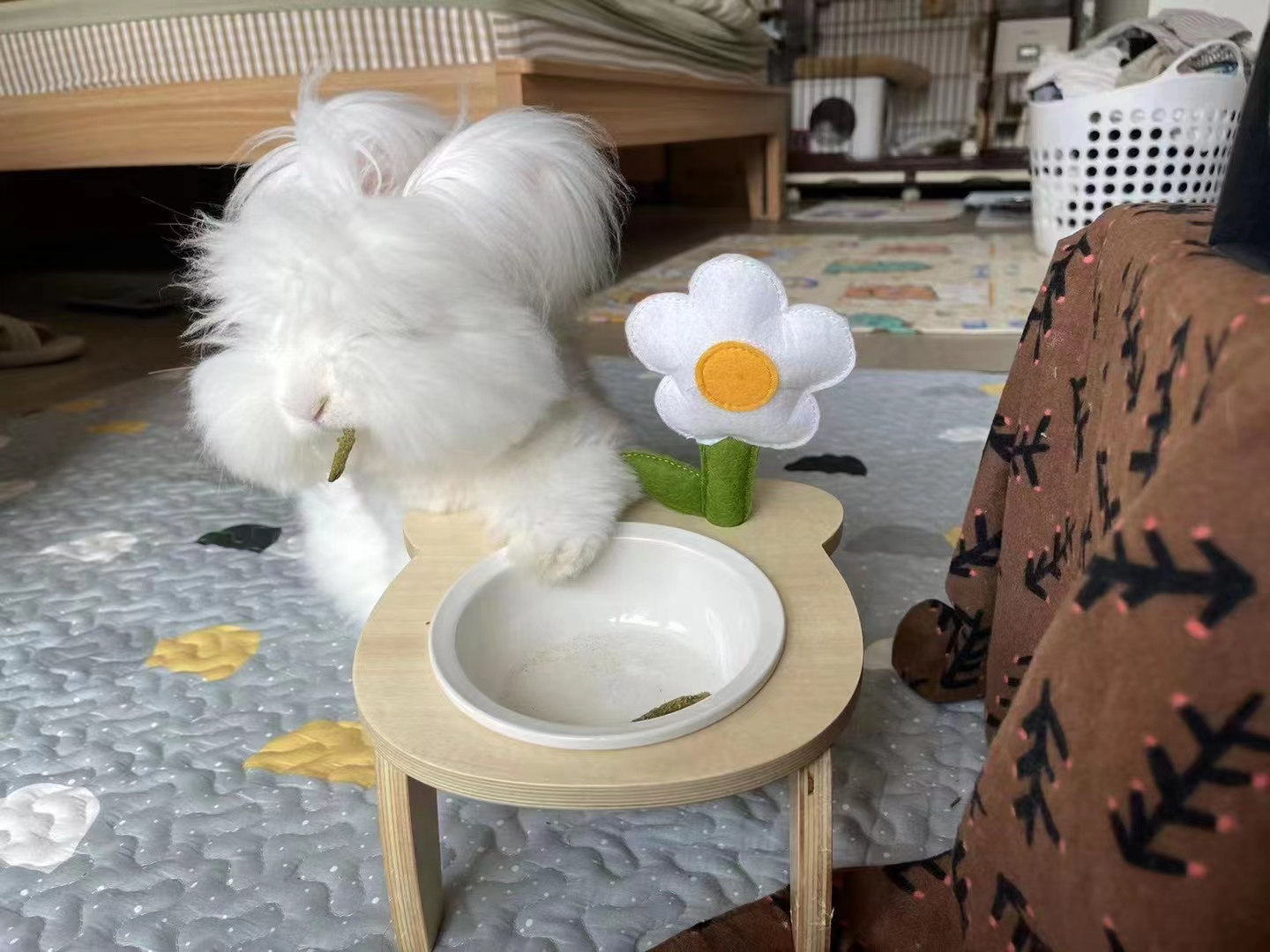


長毛兔生活習性有什么?
 發布日期:2025-04-02
來源:http://www.m6i42s8.cn 發布人:創始人
發布日期:2025-04-02
來源:http://www.m6i42s8.cn 發布人:創始人
1、夜食性(夜行性):
1. Nocturnal diet (nocturnal):
家兔具有晝靜夜動的特點。白天無精打采,閉目養神,采食量很少;夜間精神旺盛,采食、飲水增加,約占全日的70%以上。因此在晚上要喂足草料,飲足水,有條件的飼養戶可在深夜加喂一次。
Domestic rabbits have the characteristic of being quiet during the day and active at night. During the day, one may feel listless, close their eyes to rest, and consume very little food; At night, the spirit is vigorous, and the intake of food and water increases, accounting for more than 70% of the whole day. Therefore, it is necessary to feed enough grass and drink enough water at night. If conditions permit, breeders can add feeding at night.
2、嗜眠性:
2. Sleepiness:
家兔在白天常閉目養神,呈靜伏或睡眠狀態。這時除聽覺外其、他刺激不易引起興奮。根據這一習性,飼養員在保證正常喂料、飲水及日常管理工作外,應保持兔舍及周圍環境的安靜,白天盡量不要妨礙家兔睡眠。
Rabbits often close their eyes and rest during the day, in a state of stillness or sleep. At this point, other stimuli besides auditory stimulation are not likely to cause excitement. According to this habit, the keeper should maintain the quietness of the rabbit house and surrounding environment while ensuring normal feeding, drinking, and daily management work, and try not to disturb the sleep of the rabbits during the day.
3、膽小性:
3. Cowardness:
兔系膽小動物,遇有敵害時,能借助敏銳的聽覺作出判斷。突然的聲響、生人陌生的動物,如貓、等都會使家兔驚恐不安,并影響周圍家兔。因此在養管理中,動作要盡量輕穩,同是防止生人或其他動物進入兔舍。
Rabbits are timid animals that can use their keen hearing to make judgments when encountering enemies. Sudden noises and unfamiliar animals, such as cats and dogs, can make domestic rabbits fearful and anxious, and affect the surrounding rabbits. Therefore, in animal husbandry and management, movements should be as gentle and stable as possible, while also preventing strangers or other animals from entering the rabbit house.
4、喜潔性:
4. Cleanliness preference:
家兔喜愛清潔干燥的生活環境。潮濕污穢的環境,易造成家兔傳染病和寄生蟲病的蔓延。所以在兔舍設計及日常管理中,要保證圈舍清潔干燥,冬暖涼,通風良好。
Rabbits enjoy a clean and dry living environment. A damp and polluted environment can easily cause the spread of infectious and parasitic diseases in rabbits. So in the design and daily management of rabbit houses, it is necessary to ensure that the enclosure is clean and dry, warm and cool in winter, and well ventilated.

5、獨居性:
5. Solitary nature:
家兔雖有群居性,但很差。群養時不論公、母及同性別的成年兔經常發生互相爭斗現象,特別以公兔為甚。對新購進的更要引起注意。因此,一般成年都要單籠飼養。
Although domestic rabbits have social behavior, it is very poor. During group breeding, adult rabbits of both male and female genders often engage in conflicts with each other, especially male rabbits. Attention should be paid to newly purchased items. Therefore, adults generally need to be raised in single cages.
6、啃咬性:
6. Bite resistance:
家兔的對門齒是恒齒,出生時就有,永不脫換,而且不斷生長。家兔必須借助采食和啃咬硬物,不斷磨損,才能保持其上下門齒的正常咬合。因此在養兔中要注意籠舍的建設,盡量使用家兔不愛啃咬的材料,以便延長兔籠的使用年限。另外要經常給兔提供磨牙的條件,如把復合飼料加工成硬質顆粒料,或者在籠舍內多投放樹枝或木棒供兔啃,以利門齒的磨蝕,促進飼料的咀嚼和消化。
The first pair of incisors of a rabbit are permanent teeth, which are present at birth, never change, and constantly grow. Rabbits must rely on feeding and gnawing on hard objects, constantly wear and tear, in order to maintain the normal bite of their upper and lower incisors. Therefore, in raising rabbits, attention should be paid to the construction of the cage, and materials that rabbits do not like to bite should be used as much as possible to extend the service life of the rabbit cage. In addition, it is necessary to regularly provide conditions for rabbits to grind their teeth, such as processing compound feed into hard granular material, or placing more branches or wooden sticks in the cage for rabbits to chew, in order to facilitate the abrasion of incisors and promote the chewing and digestion of feed.
7、穴居性:
7. Cave dwelling nature:
穴居性是指家兔具有打洞并在洞內產仔穴居的本能行為。這一習性,對現代化養兔生產來說無法利用。不過在籠養的情況下,需要給繁殖母兔建好產仔或窩,讓母兔在箱(窩)內產仔。但是在建筑兔舍時,必須考慮到家兔的穴居性,以兔由于選材不當或設計不合理,致使有兔在舍內打洞造穴,給飼養管理來困難。
Cave dwelling behavior refers to the instinctive behavior of domestic rabbits to dig holes and give birth to offspring in caves. This habit cannot be utilized for modern rabbit farming production. However, in the case of captivity, it is necessary to build a litter or nest for the breeding mother rabbit, so that the mother rabbit can give birth in the box (nest). However, when constructing rabbit houses, the burrowing nature of domestic rabbits must be taken into account. Due to improper selection or design of rabbits, it is difficult to raise and manage them by digging holes inside the house.
8、食糞性:
8. Fecal eating:
家兔的食糞性是指家兔吃自己部分糞便的本能行為。這屬正常的生理現象,對家兔有益。通常家兔排出兩種糞便,一種是粒狀的硬糞,在白天排出。一是團狀的軟糞,在夜間排出。家兔排出的軟糞時會自然弓腰用嘴從**處吃掉,稍加咀嚼便吞咽,每天所排的軟糞全部被自己吃掉,只有當家兔生病時才停食糞。所以在管理上要注意觀察舍內是否有軟糞,如發現軟糞,應及時對家兔進行健康檢查,做到有病早治,減少損失
The fecal feeding behavior of domestic rabbits refers to their instinctive behavior of eating a portion of their own feces. This is a normal physiological phenomenon and beneficial for rabbits. Usually, rabbits excrete two types of feces, one is granular hard feces, which is excreted during the day. One is a clump of soft feces that is discharged at night. When a rabbit excretes soft feces, it will naturally bow down and eat it with its mouth from * *, chew it a little and swallow it. It eats all the soft feces it excretes every day, and only stops eating feces when the pet rabbit is sick. So in terms of management, attention should be paid to observing whether there is soft feces in the house. If soft feces are found, timely health checks should be conducted on the rabbits to achieve early treatment of diseases and reduce losses
本文由長毛兔友情奉獻.更多有關的知識請點擊:http://www.m6i42s8.cn我們將會對您提出的疑問進行詳細的解答,歡迎您登錄網站留言.
This article is a friendly contribution from Long haired Rabbit For more information, please click: http://www.m6i42s8.cn We will provide detailed answers to your questions. You are welcome to log in to our website and leave a message